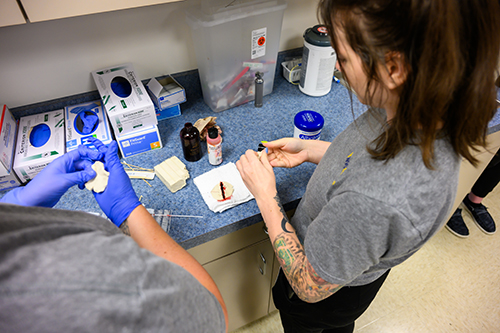Most individuals are familiar with special effects makeup in movies, but it also has an important part in healthcare education. Learners at West Virginia University benefit from this specialized technique through the David and Jo Ann Shaw Center for Simulation Training and Education for Patient Safety.
 Called moulage, the art and science of simulating injuries or wounds and illnesses with special effects makeup enhances training for medical professionals, emergency response teams and military personnel when treating patients in a simulated environment. The technique can be applied to manikins or standardized patients performing role-play.
Called moulage, the art and science of simulating injuries or wounds and illnesses with special effects makeup enhances training for medical professionals, emergency response teams and military personnel when treating patients in a simulated environment. The technique can be applied to manikins or standardized patients performing role-play.
“Moulage adds a level of realism to simulation scenarios that helps with the suspension of disbelief,” Joshua Bell, simulation operations specialist, said. “It benefits the learners by providing them with an extremely realistic patient scenario that will allow them to focus on the objectives of the simulation and not be distracted because the patient doesn’t match the scenario or seems fake. In turn, this will help the learner sharpen their assessment skills and provide better treatment options, which will translate to better patient care in real life.”
The authenticity of moulage prepares learners technically, mentally and emotionally to assess and treat patients they encounter in real-life situations. For emergency situations, moulage is particularly helpful in training healthcare providers to focus and properly assess a patient without being distracted by traumatic injuries or others in the environment to reduce morbidity and mortality.
Members of the WVU Medicine Emergency Preparedness Team and the WVU Critical Care and Trauma Institute recently had the opportunity to participate in moulage training offered by Bell and Adam Hoffman, STEPS simulation education specialist.
“One of our goals in emergency management is to conduct realistic training and exercises for our hospitals,” Elizabeth Garrasi, director of emergency management for WVU Medicine-WVU Hospitals, said. “Mass casualty incidents are one of our top risks, especially at J.W. Ruby Memorial Hospital, where we are so close to the football stadium. Should some event occur that injures several people, it would not take us long to be overrun with patients. When we conduct training drills and exercises, we want our first responders and Emergency Department to see ‘injuries’ as they really would be instead of reading off a card. This provides a higher quality experience for our teams.”
 Moulage allows learners to practice technical skills such as setting a fracture and recognizing conditions like skin infections. Learners are also able to complete a full assessment of a patient and draw their own conclusions based on clues provided by moulage instead of being told of a simulated patient’s symptoms or injury prior to the encounter. The technique can also be helpful in teaching learners about rare conditions or those they have not encountered, such as leprosy and hypothermia.
Moulage allows learners to practice technical skills such as setting a fracture and recognizing conditions like skin infections. Learners are also able to complete a full assessment of a patient and draw their own conclusions based on clues provided by moulage instead of being told of a simulated patient’s symptoms or injury prior to the encounter. The technique can also be helpful in teaching learners about rare conditions or those they have not encountered, such as leprosy and hypothermia.
Studies have shown that incorporating moulage into a simulated learning environment improves engagement and performance among participants. The immersive experience enables learners to realistically imagine themselves in the scenario and apply their knowledge and decision-making and critical thinking skills.
“This tool is critical for our preparedness,” Garrasi said. “If done correctly, we can create injuries by incorporating moulage so staff can experience what they would look like and walk through the steps of triaging and treating appropriately. This improves skillsets and can lead to better outcomes for our patients.
“We hope this is something we can build upon and continue to offer to our teams across the health system.”
Photo at top: Members of the WVU Medicine Emergency Preparedness Team and the WVU Critical Care and Trauma Institute complete a moulage training session led by simulation specialists in the West Virginia University Health Sciences David and Jo Ann Shaw Center for Simulation Training and Education for Patient Safety.
-WVU-
jw/10/23/22
CONTACT: Jessica Wilmoth
Senior Communications Specialist
WVU University Relations—Health Sciences
304-293-9528; jessica.wilmoth@hsc.wvu.edu
